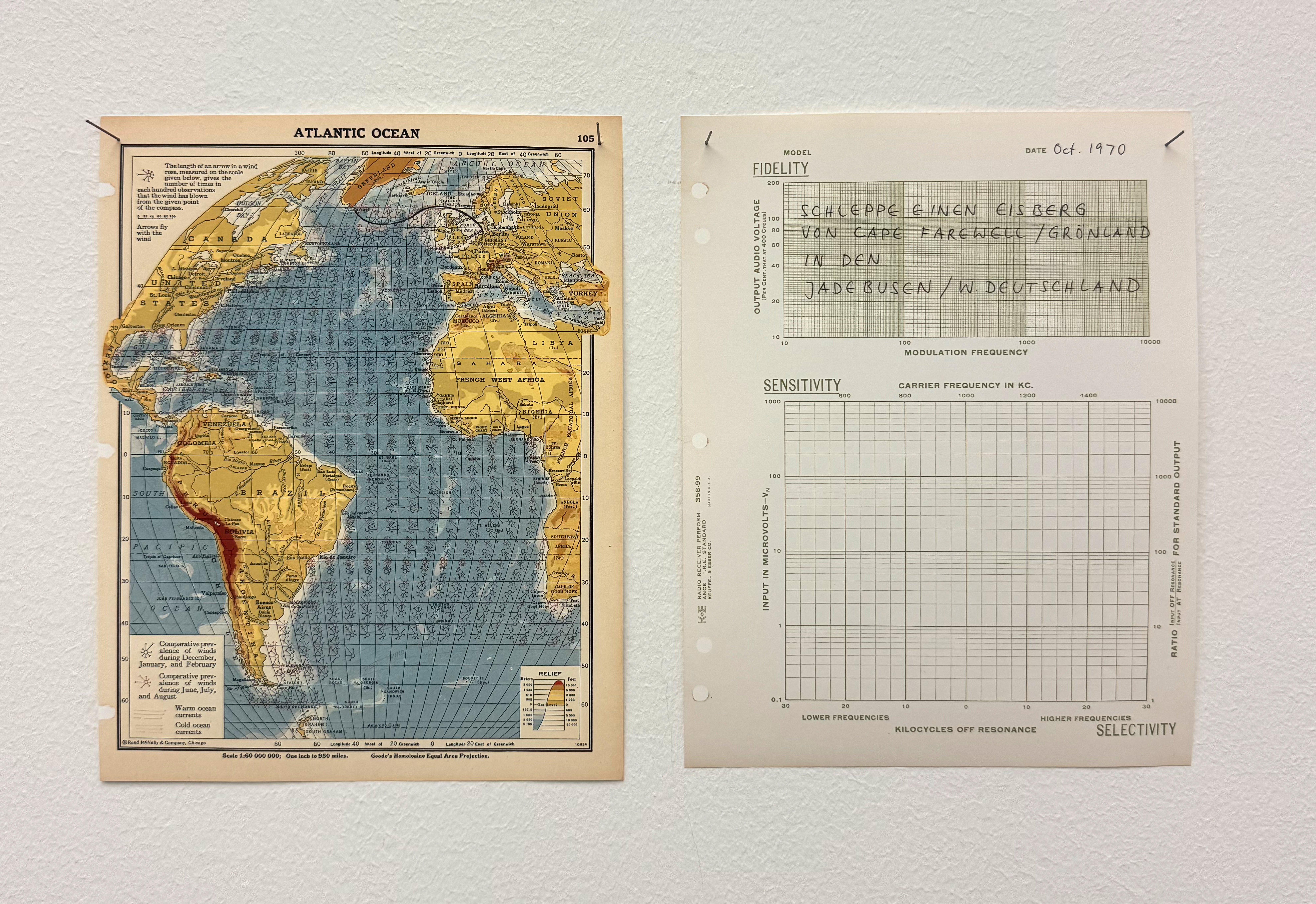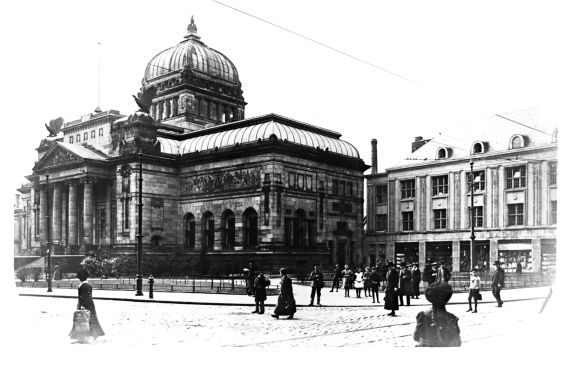OPENING TIMES
“Do WORRY be happy“ Mai 23th – August 31st 2025
Thu – Sun 2pm – 6pm Uhr (closed on public holidays)
Special opening hours for events and by appointment: kontakt@kunsthallebarmen.de
Free entry

Foto: Artwork by Christiane Möbus in the current exhibiton of the KHB
DIRECTIONS
Kunsthalle Barmen
Geschwister-Scholl-Platz 4-6
42269 Wuppertal
–> Google Maps
Suspension railway stop „Werther Brücke“ (300m)
Railroad station Wuppertal-Barmen (850m)
CONTACT + INFO
MAIL kontakt@kunsthallebarmen.de
PRESS presse@kunsthallebarmen.de
NEWSLETTER click here to register
INSTAGRAM click here
Bearer: Bergische Universität Wuppertal
Cooperation: Stadt Wuppertal
Support: LVR
Concept
Built around 1900 on the initiative of the “Barmer Kunstverein”, the Kunsthalle has always been supported by the Barmer community as a vibrant place for encounters with art. Even its inauguration was met with great public interest.
Built around 1900 on the initiative of the Barmer Art Association, the Kunsthalle has always been supported by the Barmer community as a vibrant place for encounters with art. Even its inauguration was met with great public interest.
Historical Background

The artists once shown here now fill the foundational literature on early 20th-century art. Solo exhibitions on Franz Marc, Alexej von Jawlensky, and Emil Nolde were initiated, and Marianne von Werefkin was another artist from the Kunsthalle’s early years who remains relevant today.
Barmen became a stronghold of Expressionism, with the result that by the end of the 1920s, the Barmen Art Association possessed one of the most important and respected collections of modern art in Europe.
From this collection, 94 works were confiscated in 1937 during the Nazi “Degenerate Art” campaign. Many of them were subsequently destroyed. An air raid in 1943 almost completely destroyed not only the domed structure of the Hall of Fame, but also the existing collection. All remaining works were incorporated into the collection at the Von der Heydt-Museum in Elberfeld.
In the 1950s, the building stood empty as a ruin for over ten years before reopening in 1958 under the name “Haus der Jugend.” The interior structure was redesigned, and an extension for the library was built in 1965.
In 2001, closure was first threatened due to financial reasons and a lack of visitors. Even structural renovations and the “Von der Heydt Kunsthalle” program under the curatorial direction of Gerhard Finckh could not prevent the Kunsthalle Barmen from no longer offering a consistent program in 2019 due to a lack of further suitable sponsorship.
This gap in the city’s cultural life has now become a space of opportunity for the University of Wuppertal.
The new concept of the Kunsthalle Barmen
With the signing of the contract on July 31, 2024, a collaboration between the University of Wuppertal and the City of Wuppertal was initiated for an initial period of three years. Under the curatorial and mediational direction of the Faculty of Design and Art, two comprehensive and three experimental exhibition formats will be conceived annually within the Kunsthalle.
The content of the university exhibitions and the extensive educational program is developed by the team at Kunsthalle Barmen. Overall university coordination lies with the project’s initiator, art professor Katja Pfeiffer. The unique opportunity afforded by the university’s sponsorship of Kunsthalle Barmen lies in the possibility of consistently interweaving curatorial, academic, and educational work. Here, the university encounters the city’s society and the artists. Different communities of origin, generations, and backgrounds can enter into dialogue with one another, and inclusion can be experienced. World-renowned artists encounter young artists in the exhibition context, framed by the Kunsthalle’s experimental laboratory—the LAB.
The development of the Kunsthalle Barmen’s thematic focus is the result of intensive dialogue with the student body of the Faculty of Design and Art. The desire for participation is therefore paramount in the programmatic considerations of the Kunsthalle Barmen. “We want space!” – a demand expressed to us by the student body – becomes the motivation to create a space for participation in which the suggestions and wishes of the student generation are met and new approaches to exhibiting and communicating are explored.
With the “Haus der Jugend” and the Library sharing the building, the exhibition and educational program will not be limited to the five exhibition spaces on the second floor, but will also include the foyer, the mezzanine, and the forecourt as potential spaces for exchange and art.
We can count our efforts to revitalize this traditional cultural center of the city of Wuppertal as a success if we succeed in addressing socially relevant topics with the same courageous and unruly approach as the Barmer Art Association once did, thus fulfilling the university’s mission of transferring knowledge to society in a unique way.
Participating institutions
The University of Wuppertal
“Understanding, communicating, shaping” (“Verstehen vermitteln gestalten”). This is the motto of the University of Wuppertal, an internationally renowned institution with 9 schools, around 21,500 students and 4,000 employees. Its 100 Erasmus partner universities and 70 collaborations with universities and companies form a global network, which is a benefit not only for international research projects, but also for teachers and more than 2,500 foreign students from more than 110 countries.
Located in the central Rhine-Ruhr metropolitan region, knowledge transfer and numerous partner organisations of the University of Wuppertal ensure constant, sustainable progress and cooperation with business and society, which is a great benefit to students. Furthermore, this situation encourages innovations and the creation of start-ups. The ‘Kunsthalle Barmen’ cooperation project launched in 2024 is an outstanding example of this self-image and commitment – this time by the School of Design and Art with its three departments of Industrial Design, Art and Media Design and Interior Design.
Kunst- und Museumsverein Wuppertal
The Kunst- und Museumsverein Wuppertal (Wuppertal Art and Museum Association) is the Von der Heydt Museum’s patrons’ association and currently has over 2000 members. Its collection of numerous important works of art from the 17th century to the present day is part of the museum’s permanent collection. The association emerged from the Barmer Kunstverein, founded in 1866, and the Elberfelder Museumsverein, founded in 1892, which merged in 1946. Even before that, from 1932, both the museum and the Kunsthalle were managed by the director of the Elberfelder Museum. The Barmer Kunstverein was instrumental in financing the construction of the ‘Ruhmeshalle Barmen’ (1897-1900), today’s ‘Haus der Jugend’. From 1932, the gallery floor of the ‘Ruhmeshalle’ was the venue for its exhibitions and its constantly growing collection of modern art, which was one of the most prominent in Germany until it was largely destroyed by the National Socialists.
The central concerns of the Kunst- und Museumsverein are the promotion of fine arts and culture in general as well as the preservation of historical monuments. To this end, the association supports the diverse activities of the Von der Heydt Museum and contributes to the realisation of its exhibition and educational programme for all age and target groups. Due to its historical merits in the establishment of the Kunsthalle Barmen, it usually organises an exhibition in its rooms once a year.
The City of Wuppertal
Wuppertal has around 360,000 residents, making it 17th largest city in Germany. The Bergisch metropolis is a leading production location with the largest plier’s manufacturer in Europe, the international research centre of the world’s best-known pharmaceutical company, the most modern training centre for paints in Europe and a production site for the largest paint manufacturers in the world.
The University City is an important location of the automotive industry where development centres of world market leaders are based. W-tec, which is home to around 260 companies, is one of the largest technology centres in Germany. Around 50 % of the urban area is used for gardens, parks, forests and agriculture, including 490 km of hiking trails. The Wupper, which gives the city its name, flows 34 kilometres from east to west with a fall of 95 metres. Everyday approximately 85,000 passengers use the suspension monorail, which travels 13 km through the city. The 20 suspension railway stations include different architectural styles, from Art Nouveau to high tech. After a 35-minute drive, which is a worldwide unique experience, passengers can change to an ICE. The two areas Elberfeld and Barmen invite you to shop and stay for a while. You can cheer on multiple German champions in the climbing hall, when watching roller hockey or on the official downhill course when riding a mountain bike. Around 4,500 animals live at the Wuppertal Zoo, one of the most beautiful zoological gardens in Germany. At the zoo district and at the Brill district you can visit the biggest villa district in Germany.
Are you surprised? Welcome to Wuppertal.
Cooperation partnerships
During the exhibitions at the Kunsthalle Barmen, cooperation partnerships were established with the following institutions:
- ##
- ##
The Kunsthalle Barmen is sponsored by:
- Barmenia
- Bewegung für Barmen
- Bürgerverein Barmen-Mitte. e.V.
- InnenBandStadt
- Jackstädt Stiftung
- LVR
- Dr. Jörg Mittelsten Scheid-Gastprofessur
- Sparkasse Wuppertal
Team
Prof. Katja Pfeiffer
Initiatorin und Leitung
katjapfeiffer@kunsthallebarmen.de
Christoph Westermeier
Momo Trommer
Sebastian Bartel
Marc Kox
Prof. Katharina Maderthaner
Christian Forsen
Leitung Ausstellungsproduktion
forsen@uni-wuppertal.de
Ariane Dehghan
Josef Kirschner
Technische Realisierung Website
kirschner@uni-wuppertal.de